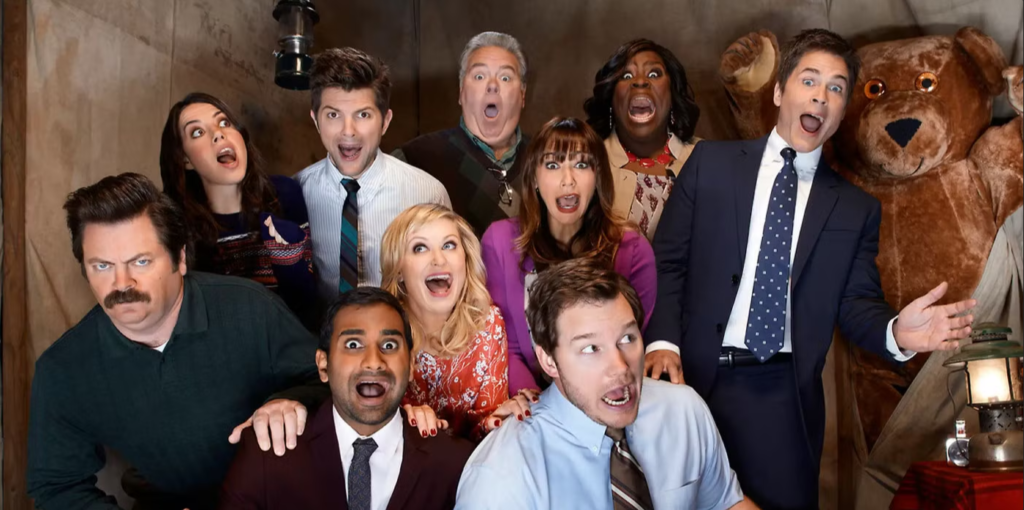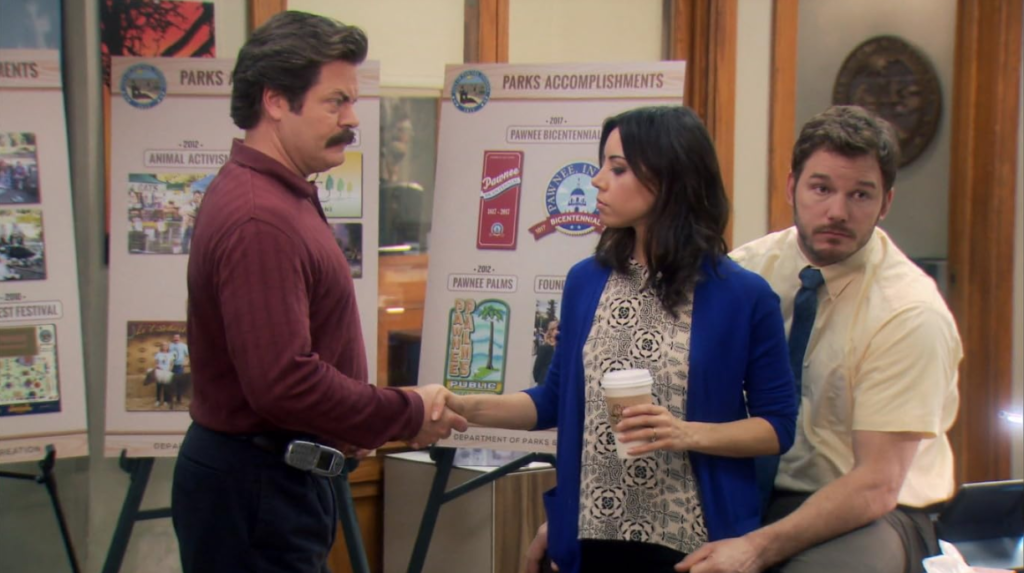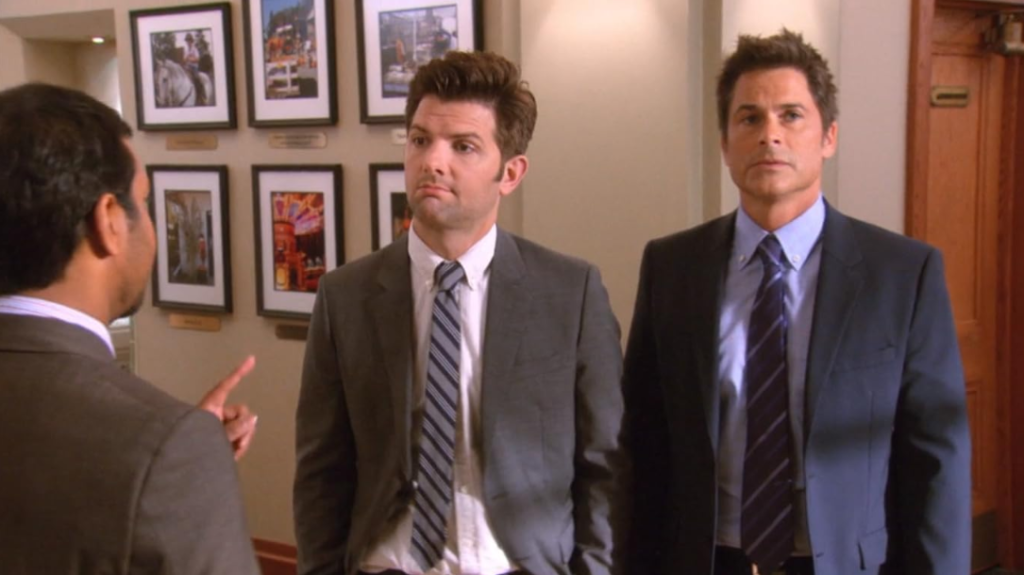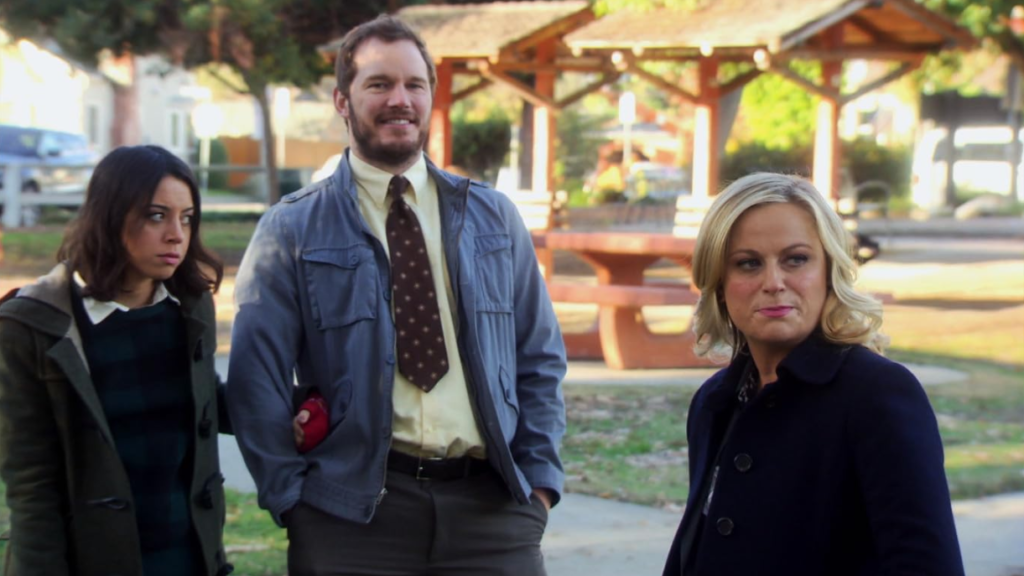
There’s only one thing I hate more than lying: skim milk, which is water that’s lying about being milk.
Parks and Recreation is a political satire mockumentary sitcom created by Greg Daniels and Michael Schur, who are known for their work on The Office (Yes… perhaps I’ll talk about The Good Place at some point). Parks and Rec is my third favorite comedy series of all time, after only Seinfeld and 30 Rock. Set in the fictional, quirky town of Pawnee, Indiana, Parks and Rec follows the lives and exploits of the town’s well-meaning public servants, led by the weirdly enthusiastic, hardworking Leslie Knope, portrayed by Saturday Night Live alum Amy Poehler. Parks and Rec is celebrated for its positive portrayal of local government, its optimistic outlook, and its ability to find humor in the mundane aspects of bureaucracy, featuring some of the smartest writing and most eccentric and hilarious characters ever presented on television.
At first, Greg Daniels and Michael Schur considered basing Parks and Rec as a counterpart of The Office by inheriting the ingenious mockumentary sitcom format and focusing on the tedious bureaucracy of local government. They initially planned on portraying a humiliated regional officer trying to rebuild his career, but when Amy Poehler signed on as Leslie Knope, it was decided to make the character an excessively enthusiastic and optimistic government worker in a small town. Throughout the series, Leslie evolves to showcase resilience and adaptability in the face of political and personal challenges, underscored by her relationships with her coworkers, particularly her best friend Ann Perkins, her husband Ben Wyatt, and her boss Ron Swanson. Leslie’s unwavering belief in good governance as a means to effect positive change makes her a role model, particularly during an era reflective of the Obama presidency’s optimism. This belief system is not only integral to her character but also to the series’ cultural significance, which ties Leslie’s character to the broader political thematic elements in the series. Her character’s progression also encompasses an emotional and professional maturation, as she learns to balance her lofty dreams with practical governance.
I wanted to make fun of stupid people while getting drunk—my two true passions.
Parks and Rec thrives on character-driven storytelling and fitting uncannily quirky characters in the same room. Nick Offerman’s portrayal of Ron Swanson, the stoically libertarian Parks Director, provides a rich counterbalance to Leslie’s idealism. Ron’s journey throughout the series reflects a subtle transformation from a rugged individualist, advocating minimal government interference, to a more nuanced individual who appreciates communal bonds at the Pawnee Parks Department. Ron’s belief in self-reliance, privacy, libertarian philosophy, and minimal government intervention, and the dead-pan humor brought upon the character quickly derive a cult following. April Ludgate, played by Aubrey Plaza, starts as an apathetic intern whose cynicism and sarcasm are a defense against engagement. Throughout the series, she transforms into an essential member of the team through her relationships, particularly with Leslie, Ron, and Andy Dwyer. April’s character arc reflects significant growth as she learns to balance her sardonic outlook with genuine care and responsibility. April’s growth illustrates the show’s broader thematic exploration of community and individuality, as she discovers purpose and fulfillment within the government framework she initially disdained. Due to the shared cynicism and values of minimal communication, Ron and Apirl’s mentor-mentee relationship leads to a striking dynamic that becomes the show’s highlight and the catalyst of the two characters’ development.
The less I know about other people’s affairs, the happier I am. I’m not interested in caring about people. I once worked with a guy for three years and never learned his name. Best friend I ever had. We still never talk sometimes.

Back in 2009, Parks and Rec was rushed into production so it could debut in the second half of the spring television season and it kicked off with a truncated season of only six episodes. Despite the impressive cast, the series debuted to a chilly reception, where the audiences found Parks and Rec was too much like The Office, and that the clueless, uptight Leslie Knope was too similar to Steve Carell’s clueless, uptight Michael Scott. The crew desperately needed something to substantially change up the dynamic and help the series find its own pace, which led to the arrival of Ben Wyatt played by Adam Scott, and his boss Sam Seaborn (I watched too much The West Wing) Chris Traeger played by Rob Lowe at the end of season 2, which basically saved Parks and Rec from cancelation. Ben and Chris immediately throw Leslie and Ron off balance with their odd demeanor: Chris is extroverted, charming, and relentlessly positive, whereas Ben is a series-minded pragmatist whose job is mostly to deliver bad news. The two characters are the solution to a very specific problem: Leslie has to be allowed to be more fun and loose and less uptight. Ben’s harsh realism puts him at odds with Leslie when they first meet, but as Ben reveals his dorky personality and softer, more compassionate side, the two eventually become an idyllic married couple with triplets. Meanwhile, Chris solves the problem of getting laughs out of Ann Perkins, who is smart, levelheaded, and seemingly the only normal person on the show. Also, Chris’ positivity contradicts sharply the cynicism of Ron and April, bringing another layer of dynamic to the Parks Department.

Parks and Rec depicted a nuanced spectrum of personalities and backgrounds through its vibrant cast, showcasing various aspects of identity and community life, confronting issues such as gender dynamics and governmental bureaucracy. The series’ emphasis on the value of community and civic engagement promotes the concept that government entities can be generators of communal solidarity and progress. Parks and Rec remains a touchstone for future television endeavors that navigate similar thematic territories. Its balance of humor, heartfelt storytelling, and social commentary ensures its critical revival legacy and affirms its status among the greatest comedies.
I have the most valuable currency in America: a blind, stubborn belief that what I am doing is 100% right.
